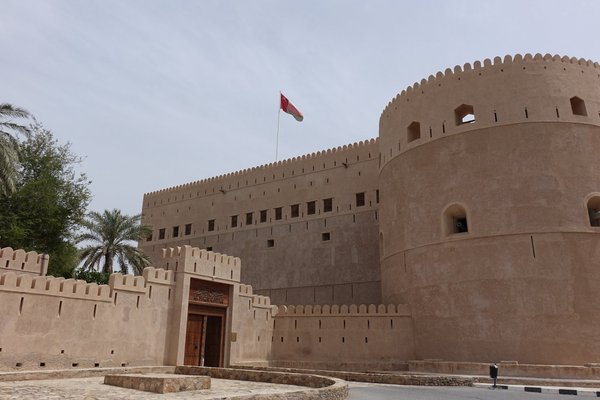Oman
The forts of Rostaq and al-Hazm
Site Info
Official Information
- Full Name
- The forts of Rostaq and al-Hazm (ID: 497)
- Country
- Oman
- Status
-
On tentative list 1988
Site history
History of The forts of Rostaq and al-Hazm
- 1988: Added to Tentative List
- Added to tentative list
- Type
- Cultural
- Criteria
Links
- UNESCO
- whc.unesco.org
All Links
UNESCO.org
- whc.unesco.org — whc.unesco.org
Community Information
- Community Category
- Secular structure: Military and Fortifications
Travel Information
Recent Connections
News
No news.
Community Reviews
Show full reviews
I visited both locations of this tentative WHS in December 2020. The best way to visit is as an afternoon side trip from Muscat as the roads are perfect for any vehicle (the road from Al Ayn still requires a 4x4 vehicle and is not worth the hassle since the best time to visit, especially for photography, is in the early afternoon before closing time).
I planned to visit Al Hazm Fort (marked as Al Hazm Castle) first, followed by Rustaq Fort and Nakhal Fort and its several watch towers nearby (even though the latter fort and towers are not up for inscription) via a convenient loop on road 13. The Al Hazm Fort (top photos) was built in the beginning of the 18th century towards the end of the reign of Al Yarubi tribe in Oman, when Rustaq was their capital. The Al Yarubi tribe is most famously known for expelling the Portuguese from Oman. They are also responsible for constructing a number of other significant Omani forts and castles including Nizwa Fort and Jabreen Castle (which I visited towards the end of my trip in Oman in January 2021). There is a clear difference between the latter two forts and Al Hazm, namely the shift in the construction of Omani forts designed to withstand gun attacks to those designed to withstand cannon attacks, with Al Hazm being the more technologically advanced structure. Since back in the 18th century, the imam resided in Al Hazm, it features numerous …
Keep reading 0 comments
You’ll easily end up with ‘fortress fatigue’ when travelling through Oman: in the past, local chiefs built them in high numbers to protect strategic positions and water sources. On my second day in the country I was still up for visiting some good forts though. Along what is called “the Rostaq loop” lie 3 worthwhile examples, of which those of Rostaq and Al-Hazmhave a combined spot at Oman’s Tentative List. The third fortress, that of Nakhal, has the prettiest setting of them all. However, the very brief tentative site description gives no clue why it could not join the other two to be part of a future WH nomination.
Rostaq is a former capital of Oman, and it holds one of the oldest remaining forts in the country. It was built on top of pre-islamic fortifications. It’s huge: while looking for a parking spot I drove for hundreds of meters all the way along its outer walls. Fortunately one can park right at the entrance.
The fort is not only large in surface, but also in height: it has 3 levels. These are connected by stairways that are not easy to find. There are great views from the roof and the towers over the surrounding countryside with its date palms. Cultivating dates was (and is) an important craft in Oman, and inside the fort there are date storage and date ‘honey’ production rooms as well. Large forts like this one in Rostaq were more like castles, where a ruling family …
Keep reading 0 comments
In case of this TWHS, the road taken was even more interesting than the actual site. We saw the burial tumuli of Al-Ayn and then decided to drive the shortest way possible to Al-Rustaq. Long story short, don't. The road seems to be okay for a while and then it gets worse before getting abysmal. 4WD would have been better, as the road gets bumpy and dusty, but at least you can catch glimpses of some unique local places. Anyway after a bumpy ride we arrived and parked our car by the fort. It was Friday, so it was closed in the afternoon, therefore we opted for the next best thing and walked around it. It's huge. If you've seen some other places of the Omani irrigation system WHS, this one has some too: there's a visible aflaj around, oasis and some wells.
Keep reading 0 comments
Rostaq fort is located at the foot of the impressive Western Hajar Mountains, a range of bare steep sided mountains. The fort itself does not seem as dramatically located though as the one nearby at Nakhal. Rostaq is distinguished by having a falaj flowing beneath it, but this feature is already included on the WHS list.
Rostaq is located on a loop road off the Batinah highway, and makes a delightful side trip when travelling between Muscat and Abu Dhabi.
Keep reading 0 comments
